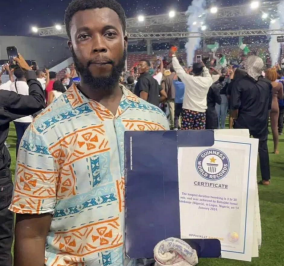Lifestyle
Twerking World Record Holder, Babajide Adebanjo: “I Don’t Allow People To Judge Me”

Babajide Adebanjo, the Guinness World Record holder for the longest twerking time, has taken the internet by storm with his impressive dance moves. In an exclusive interview, Adebanjo shares his journey and passion for dance, as well as his experiences with criticism and stereotypes.
Adebanjo’s fascination with dance began in 2014, when he was a university student. He started twerking in private, but eventually gained the confidence to share his videos online. The positive feedback and encouragement he received motivated him to keep pushing himself and exploring different ways of twerking.
When asked about his decision to contest the twerking category, Adebanjo says, “I wanted to challenge myself, showcase my dancing skills, and be a form of inspiration for others to embrace their interests, no matter how weird it might seem.”
Read also : Another Nigerian, Owoyemi Adebayo, Sets New Guinness World Record
Adebanjo’s record-breaking twerking session lasted for three hours and 30 minutes, and he says he was inspired by the freedom of self-expression that dance allows. Despite criticism and stereotypes surrounding men who twerk, Adebanjo remains confident and unapologetic about his passion.
“I am not hurting anyone. I am simply doing what I love,” he says. “I want to be an entertainer and inspire others to embrace their uniqueness and go after their goals, no matter how unconventional or crazy they might seem.”
Adebanjo also addresses misconceptions about twerking, saying it’s not just for clubs and parties, but a legitimate dance style that requires skill and practice. He hopes to break down barriers and inspire others to try new things.
In addition to twerking, Adebanjo is passionate about music and would love to collaborate with artists and release his own tracks. He is also interested in acting and hosting events or workshops to share his knowledge and enthusiasm for dance.
When asked about potential harassment or negative reactions, Adebanjo says, “I believe that sharing my passion and creativity is important, and I try not to let fear of judgment hold me back.”
Adebanjo’s family was initially skeptical about his choice of dance, but they eventually accepted and supported him. He describes himself as an outgoing and empathetic person who enjoys building strong relationships with others.
With a supportive family and a strong online presence, Adebanjo is determined to pursue his passions and make a name for himself in the entertainment industry. “I would continue creating and pursuing my interests, even if no one is watching,” he says.
Lifestyle
The Pitt, The Studio Dominate 2025 Emmy Awards

The Pitt, The Studio Dominate 2025 Emmy Awards
Hollywood’s biggest television stars gathered on Sunday night for the 2025 Emmy Awards, where two productions, The Pitt and The Studio, emerged as the night’s biggest winners.
The Pitt, a gripping medical drama set in a bustling emergency room, clinched the coveted Best Drama Series, while The Studio, a satirical comedy about Hollywood politics, not only won Best Comedy Series but also shattered Emmy records with a clean sweep across multiple categories.
In a defining moment of the ceremony, veteran actor Noah Wyle earned his first-ever Emmy after decades in television, winning Lead Actor in a Drama Series for his performance in The Pitt.
Wyle, visibly moved, dedicated the award to healthcare workers worldwide, describing the show’s success as “a reflection of the courage and sacrifice of those who save lives every day.”
Seth Rogen’s The Studio proved unstoppable in the comedy category, taking home 13 trophies — the highest number of wins for a comedy series in a single year, according to the Television Academy.
Rogen, who co-created and starred in the show, also walked away with Lead Actor in a Comedy Series, his first Emmy.
He called the triumph “the proudest moment” of his career.
Critics have hailed The Studio for its sharp wit and insider satire, offering audiences a humorous but piercing look into Hollywood’s inner workings.
The series’ record-breaking feat now places it among the most celebrated comedies in Emmy history.
Industry watchers say the dual success of The Pitt and The Studio signals a shift in Hollywood storytelling, with both shows reflecting real-world struggles and triumphs in institutions — healthcare and entertainment — that resonate with global audiences.
The victories came against formidable contenders including Severance and Abbott Elementary, underscoring the appetite for fresh narratives that balance cultural depth with entertainment.
As the night drew to a close, the Emmy spotlight rested squarely on The Pitt and The Studio — productions that not only entertained millions but also reinforced television’s enduring power to mirror society.
Lifestyle
Jay-Z Emerges World’s Richest Musician with $2.5bn Net Worth — Forbes

Jay-Z Emerges World’s Richest Musician with $2.5bn Net Worth — Forbes
American rap icon and business mogul, Sean Carter, better known as Jay-Z, has been declared the world’s richest musician by Forbes with an estimated net worth of $2.5 billion.
The Roc Nation founder’s fortune cuts across multiple ventures, including his luxury champagne brand, Armand de Brignac (Ace of Spades), cognac label D’Ussé, and his stakes in real estate, hospitality, technology, and startups.
He also reaped huge gains from the sale of music streaming platform Tidal and his former clothing line, Rocawear.
Jay-Z’s rise to the top further cements his reputation as not only a cultural force but also one of the most successful music entrepreneurs globally.
On the female side, American pop star Taylor Swift retained her crown as the richest female musician, with a net worth of $1.6 billion.
Forbes noted that Swift remains the first artist in history to attain billionaire status solely from music and touring earnings.
Lifestyle
Single Mothers Can’t Raise Boys Into ‘Proper Men’ – Jim Iyke

Single Mothers Can’t Raise Boys Into ‘Proper Men’ – Jim Iyke
Nollywood star, Jim Iyke, has stirred controversy with his recent remarks on parenting, insisting that single mothers cannot raise a boy into a “proper man” without the presence of a male figure.
Speaking during an interview with Okay 101.7 FM in Accra, Ghana, the actor argued that women are naturally built to nurture but lack the disciplinary balance needed to raise boys into men.
“A woman can’t raise a man. You can’t, you’re not built for it. A single mother cannot raise a man properly. You need a male influence – go get your brother that’s doing well or your father or even any man that you trust. There has to be a male presence in it [raising a boy child],” Iyke said.
He further maintained that boys require strict guidance from men in order to grow into disciplined adults.
“Because women are naturally built to nurture, to love. And then what you’re going to raise is a very weak man? He is going to be everything like the men that left you. You need somebody that would discipline him, tell him ‘No’ as often times as possible, and put him in the grind,” he added.
Iyke’s remarks have since triggered heated debates across social media, with some agreeing with his perspective while others accused him of undermining the struggles of single mothers who successfully raise responsible children without male support.
The actor, who has often been outspoken on social issues, did not back down on his position, stressing that the absence of a male role model leaves a critical gap in raising boys.
-

 News6 days ago
News6 days agoTrump Hails ‘Turnaround for the Ages’ in Record 110-Minute Address
-

 News6 days ago
News6 days agoMexico in Turmoil After CJNG Kingpin Killed in Military Operation
-

 Analysis6 days ago
Analysis6 days agoSavannah Shield and the Security Recalibration of Kwara State
-

 Analysis6 days ago
Analysis6 days agoWho Is After Peter Obi? By Boniface Ihiasota
-

 News6 days ago
News6 days agoCARICOM Chair Engages Guyana in Fresh Push for Regional Integration
-

 News6 days ago
News6 days agoUK Court Hears Recordings in Diezani Bribery Trial









